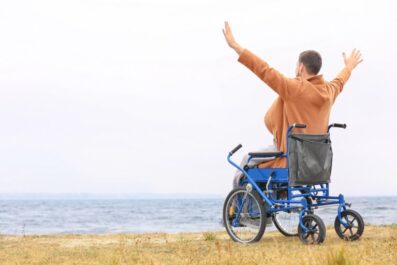Understanding the Physical and Psychological Trauma of Motorcycle Accidents

Motorcycle accidents are some of the most devastating events on the road, often resulting in severe injuries and profound psychological impacts. The unique vulnerabilities of motorcyclists, such as limited protection compared to car occupants, make these incidents particularly perilous.
Beyond the immediate physical injuries, survivors frequently grapple with long-term physical limitations and significant psychological trauma. This article delves into the physical injuries commonly sustained in motorcycle accidents, the psychological aftermath, and the long-term impacts on survivors’ lives.
The Immediate and Long-term Consequences
Motorcycle accidents often result in a range of physical injuries, from minor abrasions to life-threatening conditions. Common injuries include fractures, especially in the limbs, due to the lack of protection during a crash.
Traumatic brain injuries (TBIs) are also prevalent, even among those wearing helmets, as the force of impact can cause significant brain damage. Additionally, spinal cord injuries, which can lead to partial or complete paralysis, are frequent and have a profound impact on the victim’s quality of life.
The recovery process from these injuries is typically prolonged and arduous. Surgeries, physical therapy, and extensive rehabilitation are often required, and some injuries may result in permanent disabilities.
The financial burden of medical treatments, coupled with the loss of income during recovery, adds another layer of stress for survivors and their families. Chronic pain and mobility issues can further impede daily activities, necessitating long-term care and support.
Trauma Beyond the Physical
The psychological impact of motorcycle accidents is often as debilitating as the physical injuries. Survivors frequently experience post-traumatic stress disorder (PTSD), which can manifest as flashbacks, severe anxiety, and nightmares related to the accident. The sudden and violent nature of motorcycle crashes often leaves a lasting imprint on the psyche, making it difficult for victims to return to normalcy.
Depression is another common psychological aftermath, exacerbated by the loss of mobility, independence, and the ability to participate in previously enjoyed activities. The stigma associated with visible injuries and the need for ongoing medical care can lead to feelings of isolation and helplessness.
Counseling and psychological therapy are crucial in addressing these issues, helping survivors to process their trauma and develop coping strategies. Support groups can also provide a sense of community and understanding, reducing the sense of isolation.
Long-term Effects and the Road to Recovery
The long-term effects of motorcycle accidents extend far beyond the initial injuries and immediate psychological trauma. Survivors often face a prolonged period of adjustment as they learn to live with their new physical limitations and psychological challenges. The journey to recovery is not linear; it involves setbacks and requires a strong support system of family, friends, and medical professionals.
Vocational rehabilitation may be necessary for those unable to return to their previous employment, requiring them to learn new skills or adapt to different roles. The financial strain from medical expenses and lost income can lead to significant stress, necessitating financial planning and assistance. Legal battles for compensation and insurance claims add another layer of complexity to the recovery process.
Despite these challenges, many survivors find new purposes and motivations in life. Engaging in physical activities suited to their abilities, participating in advocacy for motorcycle safety, and sharing their experiences to help others can provide a sense of accomplishment and fulfillment. The resilience and determination required to overcome such trauma can lead to personal growth and a renewed appreciation for life.
The Role of Motorcycle Accident Attorneys
Navigating the aftermath of a motorcycle accident often involves complex legal challenges, making the support of motorcycle accident attorneys invaluable. These legal professionals specialize in the nuances of motorcycle accident cases, understanding the unique factors that can influence outcomes, such as road conditions, vehicle defects, and driver negligence.
Motorcycle accident attorneys play a crucial role in helping survivors secure the compensation needed to cover medical expenses, lost wages, and long-term rehabilitation costs. They advocate for the rights of victims, ensuring that insurance companies and opposing parties are held accountable.
Additionally, by handling the legal intricacies, they allow survivors to focus on their physical and psychological recovery, providing peace of mind during a tumultuous time.
Navigating Insurance and Compensation Claims
In the wake of a motorcycle accident, dealing with insurance companies and compensation claims can be particularly challenging. Motorcyclists often face hurdles when pursuing claims due to misconceptions about the safety and responsibility of motorcyclists.
As explained by experts from Morgantown motorcycle accident attorneys, insurance adjusters may attempt to minimize payouts or shift blame onto the rider, making it essential for victims to have knowledgeable legal representation. Motorcycle accident attorneys are adept at negotiating with insurers and ensuring that victims receive fair compensation for their losses.
They gather evidence, such as accident reports, medical records, and witness testimonies, to build a strong case. By advocating on behalf of their clients, attorneys help secure the financial resources necessary to address immediate and future needs, including ongoing medical care and potential modifications to living arrangements.
The Importance of Community and Support Networks
In addition to legal and medical support, having a strong community and support network is vital for the recovery of motorcycle accident survivors. Family, friends, and support groups can offer emotional encouragement and practical assistance, such as helping with daily tasks or providing transportation to medical appointments.
Support groups, specifically those for motorcycle accident survivors, can be particularly beneficial, as they connect individuals with similar experiences and challenges. These communities provide a platform for sharing coping strategies, receiving advice, and fostering a sense of camaraderie. Building a robust support network can significantly impact a survivor’s mental and emotional well-being, aiding in their overall recovery process.
Rehabilitation and Adaptive Strategies for Daily Life
Rehabilitation following a motorcycle accident often extends beyond physical recovery, requiring the adoption of adaptive strategies to manage daily life effectively. Survivors may need to adjust to new physical limitations, necessitating modifications to their homes or workplaces to accommodate disabilities.
Occupational therapy plays a crucial role in helping individuals regain independence by teaching them how to perform daily tasks differently and more efficiently. Additionally, integrating assistive devices, such as prosthetics or mobility aids, can significantly enhance quality of life.
Emotional and psychological support during this phase is equally important, as adapting to new routines and overcoming barriers can be emotionally taxing. Professional guidance, combined with personal resilience and a supportive network, helps survivors to navigate these changes and improve their overall functionality and well-being.
Conclusion
Understanding the multifaceted impacts of motorcycle accidents, including physical injuries, psychological trauma, and the long-term adjustments required, is crucial for providing effective support to survivors.
The role of motorcycle accident attorneys in navigating legal and insurance challenges, combined with the importance of community support, underscores the comprehensive approach needed for recovery. By addressing both the tangible and intangible aspects of post-accident life, survivors can better manage their journey toward healing and reclaiming a fulfilling life.





